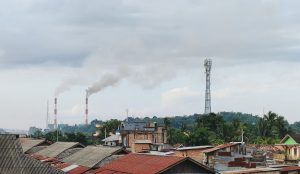Indonesian President Prabowo Subianto is currently making his international debut after being sworn into office on October 20. Media reports suggested that he will be visiting five countries – China, the United States, Peru, Brazil, and the United Kingdom – with a series of back-to-back meetings over the next two weeks.
While his agenda in China and the U.S. may show a strong signal of Indonesia’s non-aligned foreign policy, the trip also offers a golden opportunity to foster Indonesian climate diplomacy under his new presidency.
Prabowo will skip the United Nations Climate Change Conference of the Parties (COP29), which is being held November 11-22 in Baku, Azerbaijan, due to an overlap with the Asia Pacific Economic Cooperation (APEC) Summit in Lima and the Group of 20 (G-20) Summit in Rio de Janeiro. Instead, he has appointed his brother Hashim Djojohadikusumo to lead the Indonesian delegation to COP29.
Despite geopolitical headwinds and economic challenges, the climate agenda remains a critical issue for Prabowo to emphasize with his foreign counterparts during this trip. This is important not only for advancing Indonesia’s national interests but also for advancing collective progress toward shared global objectives in mitigating climate risks.
Indonesia has demonstrated a shared commitment to combating climate change, both bilaterally and multilaterally, notably with China, the U.S., and Brazil. However, long-overdue negotiations have stalled the implementation of these collaborations.
For instance, Indonesia and China have steadily deepened their bilateral relationship, characterized by significant growth in investment and trade. Chinese investments in Indonesia have increased from $628 million in 2015 to $7.4 billion in 2023. China is Indonesia’s largest trading partner with an export value that rose from $17.6 billion in 2014 to $64.9 billion last year.
Indonesia is also the single largest beneficiary of Belt and Road Initiative (BRI) funding, with $7.3 billion in investments. As BRI is pivoting toward more renewable projects, Indonesia should capture this opportunity to speed its transition away from fossil fuels.
Currently, collaborations between China and Indonesia in the critical minerals sector, particularly nickel, have been perceived lacking in environmental surveillance. Both countries must work together to develop a cleaner nickel industry, driven by their complementary economic interests and shared commitment to sustainable development. Given China’s status as a global leader in renewable energy, Indonesia should also learn from China’s success in policy formulation and strategic planning in the sector.
With the U.S. and its partners, Indonesia in 2022 signed a landmark $20 billion climate finance commitment through the Just Energy Transition Partnership (JETP). Two years after the agreement, JETP has shown little progress due to the scheme’s financial structure, disbursement delays, and Indonesia’s inadequate and uneven grid infrastructure, among other things. The Indonesian Ministry of Energy and Mineral Resources stated that JETP has allocated only $500 million out of the promised over $20 billion as of August, mainly for geothermal projects.
Amid the global transition toward electric vehicles, Indonesia has long been courting U.S. carmakers, including Tesla and Ford, to set up manufacturing facilities in the country. Due to the challenging geopolitical conditions, however, it has struggled to do so.
While there has been no official confirmation of whether Prabowo will meet with U.S. President-elect Donald Trump, Indonesia under Prabowo may face a challenging path in advocating on several climate-related issues, including the future direction of JETP and a preferential trade agreement for Indonesian critical minerals in the U.S. market.
With Brazil, Indonesia shares a status as a nation with one of the world’s largest areas of rainforest. In 2022, the world’s three largest rainforest nations – Brazil, the Democratic Republic of Congo, and Indonesia – signed a trilateral agreement referred to as the “OPEC for rainforests.” However, after two years, there are no further details on the alliance framework or funding mechanisms for preserving the “world’s lungs.”
Prabowo’s main agenda in Brazil is to attend the G-20 Summit, and Indonesia can use the multilateral platform to actively lobby for increased financial support for forest conservation and climate action initiatives.
Indonesia and Brazil can combine influence to pressure the international community into fulfilling financial commitments such as Green Climate Fund or REDD+ (Reducing Emissions from Deforestation and Forest Degradation). By leveraging their collective influence, Indonesia and Brazil have significant potential to reshape global efforts in rainforest protection.
In Peru, Prabowo will attend the APEC Summit in Lima. As food security becomes one of the organization’s foremost priorities this year, Prabowo’s engagement is not only essential for addressing Indonesia’s own food security challenges but also reinforcing the region’s sustainable food supply chain.
For Prabowo, advancing food security is also a key component of his agenda as the agriculture supply chain is increasingly under threat due to climate change and resource scarcity. Prabowo can use this multilateral platform to adopt collective strategies for strengthening food systems across the Asia-Pacific.
The fifth and final country that Prabowo will visit this month, the U.K. could also play a significant role in enhancing Indonesia’s renewable energy capacity. The two countries have undertaken a number of bilateral collaborations in mitigating climate change, including low-carbon transport and carbon pricing.
Nonetheless, bringing a climate agenda to the table is essential for Prabowo to demonstrate Indonesia’s proactive approach to combating climate change during his upcoming trip. he will not only represent Indonesia’s perspective, but also has the opportunity to amplify the voice of developing countries, given Indonesia’s growing influence as a pivotal middle power and emerging economy. Failing to do so would mean that Prabowo might waste the opportunity to advocate for the interests of both Indonesia and developing economies.

































